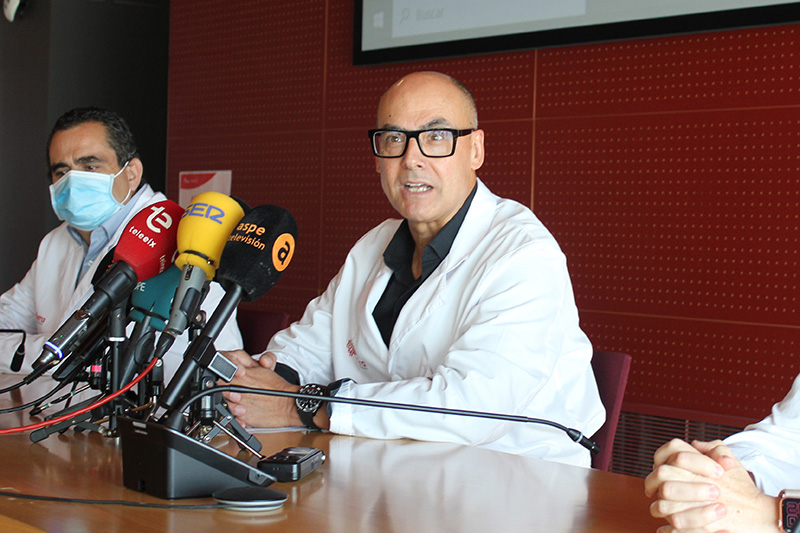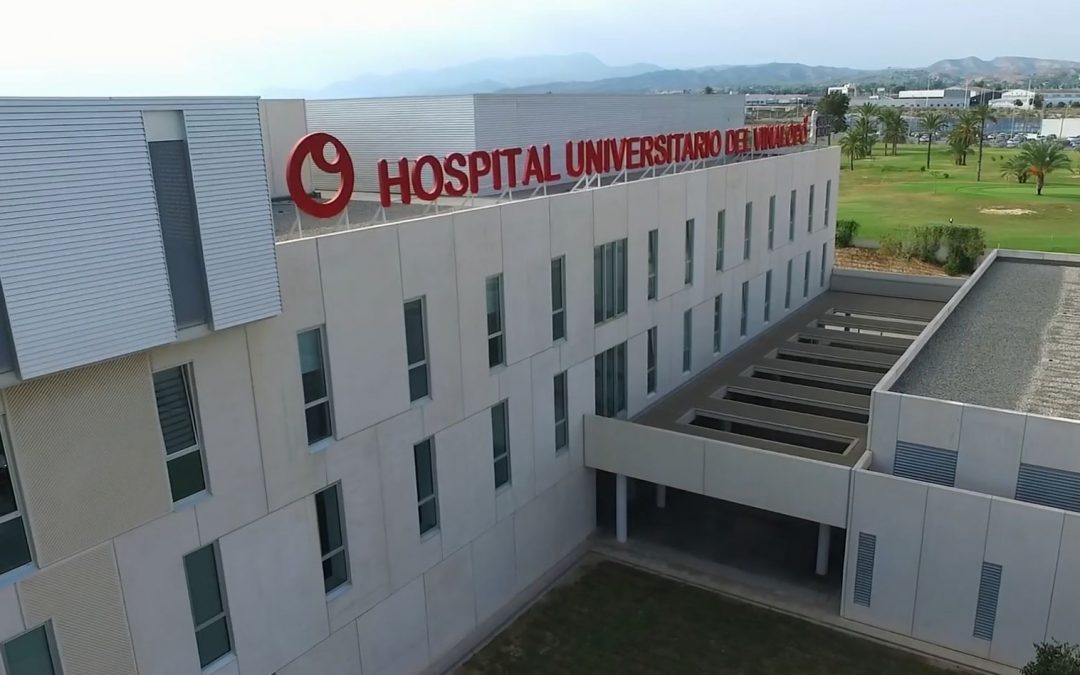
by S0p0rt3 | Jun 20, 2023 | Ribera |
- The ODELIA research project aims to “overcome the obstacles of collecting information on patients’ health with guarantees” in order to advance early, better and more accurate diagnosis and treatment.
The Ribera healthcare group is participating in a European research project, christened ODELIA, which seeks to facilitate the massive analysis of patient data, thanks to Artificial Intelligence (AI) to prevent breast cancer. Specifically, and as explained by ODELIA’s management, this project aims to “overcome the obstacles to the collection of information on the health of patients with guarantees”, to advance in early, better and more accurate diagnosis and treatment of different pathologies, especially of some types of cancer, such as breast cancer.
Ribera is a leader in the diagnosis and treatment of breast cancer, with a Breast Area headed by Dr. Julia Camps and made up of a multidisciplinary team of almost a hundred professionals. The participation of the Ribera health group, through its foundation, in this European project allows it to form part of the team that is already designing open source software to develop the first clinically useful AI algorithm for the detection of breast cancer in magnetic resonance imaging.
About Odelia
The ODELIA consortium brings together partners from twelve academic institutions and industrial partners from across Europe, namely: European Institute for Biomedical Imaging Research (Austria), Aachen University Hospital (Germany), Vall d’Hebron Institute of Oncology (Spain), Mitera Hospita (Greece), Radboud University Medical Center (The Netherlands), University Medical Center Utrecht (The Netherlands), the Ribera Health Group (Spain), Fraunhofer Institute for Digital Medicine MEVIS (Germany), OSMIS (Belgium), Technische Universität Dresden (Germany), University of Zurich (Switzerland) and the University of Cambridge (UK). The project will run until December 2027 and has funding of around €8.6 million.

by S0p0rt3 | Jun 14, 2023 | Ribera |
- Investment of 140 million euros in the Vinalopó Health Department in infrastructures, equipment and technology
- 13 years with delays below the average for public hospitals and benchmark specialities
- Vinalopó is the only department in the Valencian Community with the Joint Commission International accreditation and the first in Spain with the certification of the Cardiac Surgery service.
The Vinalopó health department, managed by the Ribera health group, celebrates its thirteenth anniversary since it was founded on 1 June 2010. Thirteen years of tireless work that has set a fixed roadmap: to offer excellent care of the highest quality to the department’s patients.
With this in mind, the centre’s management is working on a Strategic Plan for the Health Department that will be developed over the next few years and shows Ribera’s commitment to different lines of work: mental health, primary care, the heart area and waiting lists.
In a context in which mental health plays a fundamental role in the prevention of complex illnesses, Vinalopó has included this speciality in its roadmap with a comprehensive care plan that includes a commitment to super-specialised units to offer a more personalised response to the patient.
On the other hand, the manager Rafael Carrasco, has highlighted the commitment to develop a specific plan to attract talent, designed at national level with the People Management of Ribera, and especially aimed at primary care professionals, given the difficult time that this speciality is going through at national level due to the shortage of doctors. “Primary care comes first” is the slogan of this campaign, which aims to strengthen health centres and offer a more immediate response to patients. In this sense, Ribera also has innovative care formulas in the primary care area, such as the chronic care plan, artificial intelligence, YOsalud and the Shared Demand Management Plan, which enable it to improve response times and delays.
As for the heart area, the strategic plan includes a review of emergency care in the southern area of Alicante and even in the province. “Elche has gained in coronary care but we can still improve. We have to work to guarantee the best care for our patients,” explained Rafael Carrasco.
13 years at the forefront of Valencian health care
The Vinalopó University Hospital and its network of health centres have become one of the best health centres in the region in terms of quality of care and accessibility. This has been thanks to the strong investment that the group has allocated to the Department since its inception. Ribera has already invested around 140 million euros in technology, infrastructure, human resources and other healthcare and humanisation projects in these first 13 years. In 2023 alone, the hospital has incorporated a SPECT-CT scanner in the Nuclear Medicine area, a technology not available in other centres and which places the service at the forefront of cutting-edge technology.
In terms of healthcare quality, it is worth remembering that Vinalopó was the first centre in Spain and the second in Europe to achieve Joint Commission International certification for the Cardiac Surgery service. It is also the only health department in the Valencian Community with all its primary care centres and hospital accredited globally by this prestigious accrediting body.
“We are proud to celebrate thirteen years with these certifications. We have ratified the guarantee and excellence that we provide to our patients by complying with the most demanding international standards of quality and safety,” says Dr. Rafael Carrasco, manager of the department.
The hospital and health centres work every day to maintain excellence in care indicators. In this respect, waiting times remain below the average for public hospitals. In addition, it should be noted that the hospital is part of transversal projects at national level, such as the corporate Breast Unit or the Ribera Heart Area.
On a social level, Vinalopó has consolidated its position as a responsible organisation with initiatives such as Patient Council meetings, dissemination projects, volunteering activities and other actions related to sustainability and aligned with the Sustainable Development Goals of Agenda 2030.
Dr. Carrasco insisted on the importance of placing the patient at the centre of all decisions, always thinking of offering the best care. In this regard, he recalled that the Vinalopó University Hospital has a wide range of services and reference specialities such as Cardiac Surgery, Nuclear Medicine, Haemodynamics, Thoracic Surgery and Vascular Surgery, among others. As well as reference units such as the delivery area that women from all over the province choose to bring their babies into the world.
In terms of the humanisation of healthcare, Vinalopó is a hospital with an innovative vocation, being one of the few centres in Spain to have a protocol for visiting pets for long-stay patients, as well as a plan for severe or serious functional diversity that guarantees universal accessibility in healthcare, improving the experience of patients and their quality of life.
Excellent results
The management team of the centre has presented the balance of activity of these 13 years of activity.
- Interventions: 204,842
- No-admission surgery rate: 70%.
- First consultations: 1.349.967
- Subsequent consultations: 3.924.026
- Births: 19,398
- Evidence:
- Radiological: 2,303,638
- PET-TAC: 45,612
- Anatomical Pathology: 272,823
- Hospital emergencies: 1.109.318
- Hospital emergencies + health centres: 1,736,318

by S0p0rt3 | Jun 12, 2023 | Ribera |
- Vinalopó is the second centre in the province of Alicante and the only hospital in Elche to carry out this type of intervention.
- The 51-year-old patient, who underwent heart surgery for two valvular heart diseases, was discharged after 48 hours.
- The leadless pacemaker is 93% smaller and reduces the likelihood of complications from conventional pacemakers.
The Hospital Universitario del Vinalopó, part of the Ribera healthcare group, has successfully implanted the first pacemaker without wires, making it the first hospital in Elche and the second in the province of Alicante to perform this type of intervention. It is a device that eliminates complications related to the manipulation of the wires for connection to the heart through the veins. It is also an improvement due to its reduced size (93% smaller) and the elimination of the subcutaneous pocket where conventional pacemakers are placed.
The Electrophysiology and Arrhythmia Unit has implanted this first device in a 51-year-old patient who had undergone heart surgery for two valvular heart diseases and who, after the operation, required a pacemaker implant. “We decided to implant the device without wires to avoid any damage to the tricuspid valve that had been operated on. After the intervention, the patient was discharged after 48 hours in perfect health,” explains Dr. Luis González, head of the Unit.
Pacemakers are implantable devices used to treat people with certain heart rhythm disorders. “They require a surgical procedure that involves implanting an electrical pulse generator (battery) and an intravenous electrode lead. One end of the electrode is placed on the inner wall of the heart and the other end is connected to the generator”.
Conventional pacemakers require the doctor to make a surgical incision in the chest, where the pacemaker sits in a ‘pocket’ that forms permanently under the skin. The doctor then implants the pacemaker leads through the veins to reach the heart.
Wireless and 93% smaller
By being placed directly into the heart without the need for a surgical pocket or pacing wires, leadless pacemakers reduce the risk of complications. The device, designed by Medtronic, is 93% smaller than a conventional pacemaker, measuring about 2.5 centimetres, has a volume of 0.8 cubic centimetres and weighs only 2 grams. It consists of a pulse generator that includes a battery and an electrode that sends impulses to the heart when it recognises a problem with the heart rhythm and has legs that serve to anchor it to the wall of the right ventricle.
The leadless pacemaker offers a minimally invasive option as it is implanted through the femoral vein with a steerable catheter, eliminating the need for a surgical pocket and leads, reducing the overall incidence of complications by about 50%. It also increases patient satisfaction because it does not leave scars or bulges under the skin.

by S0p0rt3 | Jun 5, 2023 | Ribera |
- On World Environment Day, the group highlights the value of environmental certifications and policies that contribute to the sustainable development of an essential and essential activity such as health care
- Environmental protection and pollution prevention are allied to the responsible health policy pursued in its twelve hospitals, 35 polyclinics and 64 primary care centres.
For more than 25 years, the Ribera healthcare group has been developing policies that contribute to the sustainable development of its activity. Linked to its responsible health policy, the group is committed to protecting the environment and preventing pollution, aware that its commitment also has a positive impact on the health and well-being of the citizens of the areas in which it operates. In fact, the group’s 2022 Sustainability Report, which will be published shortly, highlights the fact that 84% of the energy consumed in its twelve hospitals, 64 primary care centres and 35 polyclinics of the Ribera healthcare group is of renewable origin.
In the context of World Environment Day, the Ribera Group wanted to highlight some of the most important environmental indicators of its activity. World Environment Day is the world’s largest global platform for environmental awareness and is celebrated by millions of people around the world, led by the United Nations Environment Programme (UNEP) and celebrated every 5 June since 1973. This year the UN is making an urgent call to “keep global warming below 1.5 degrees Celsius this century by halving annual greenhouse gas emissions by 2030”. If we don’t act now, he says, “exposure to polluted air will increase by 50% in this decade”. “Time is running out and nature is in a state of emergency,” says this year’s campaign, a video of which can be seen here.
The Ribera healthcare group holds numerous environmental certifications and has a corporate Environmental Policy that applies to all its activities. The management of energy, waste and development, as well as the constant monitoring of the results of the climate strategy are some of the pillars on which the environmental policy pivots. In addition to the certifications obtained in previous years, which are renewed annually, in 2022 the Hospital Universitario del Vinalopó will receive ISO 14001 certification for its Environmental Management Systems, and the hospitals of Denia, Ribera Hospital de Molina (Murcia) and Ribera Juan Cardona (Ferrol) will receive Carbon Footprint certification.
Over the years, Ribera has taken appropriate measures to protect and improve the environment and minimise its environmental impact, where necessary, by complying with the relevant regulations in force. In addition, during 2022, it has developed action plans focused on expanding the number of hospitals with a certified carbon footprint; registering the carbon footprint with the Ministry of Ecological Transition and the Demographic Challenge; continuing to reduce the use of plastic; training professionals in good environmental practices, with special emphasis on the correct segregation of waste; and raising awareness of the sustainable use of resources.
The healthcare group allocates almost one million euros to the prevention of environmental risks. In addition, the group highlights that the Vinalopó Hospital has four Joint Commission International accreditations (Enterprise, Coronary Bypass Surgery Programme, Vinalopó Health Department and Hospital) and the Ribera Povisa hospital has also been accredited by the Joint Commission International. This is the most prestigious health accreditation that allows these hospitals of the group to be among the best centres in the world. In fact, one of the key aspects to obtain it is to accredit good risk management, in particular the environmental part of the management.
The group has waste management plans that aim to disclose information on the type, location, identification, storage conditions, safe use and disposal of hospital materials and waste, each according to its classification. Seventy-seven per cent of the waste generated by the group is categorised as “non-hazardous”.
Reducing food waste, energy and water consumption
Management to reduce food waste is another of the cornerstones of the group’s environmental policy. For example, at the Ribera Juan Cardona Hospital, they are committed to halving food waste through the Stop Food Waste programme, and the Torrejón Hospital has a protocol against food waste, as a result of which it has managed to reduce it by 49% compared to 2021. At Ribera Povisa Hospital, for example, they prioritise the purchase of single-dose products, so that the waste in the preparation of meals is minimal.
With regard to the group’s energy consumption, in 2022 it has been reduced by 15% compared to the previous year. In addition, Ribera continues to be committed to renewable energy generation and to purchasing from renewable energy suppliers. These measures aim to reduce the group’s carbon footprint through the use and production of renewable energy. During the past year, the Ribera Polusa Hospital and the Santo Domingo Clinic, the Ribera Povisa and Ribera Juan Cardona hospitals and the Denia Health Department have joined the use of renewable electricity. Together with Torrejón Hospital, Vinalopó and its health centres and Ribera Hospital de Molina, the Group has purchased 34,413.63 mWh of electricity from 100% renewable sources, which represents 84% of the total electricity purchased this year.
With regard to the renewable energy produced, the Ribera healthcare group has solar panels at the Vinalopó, Torrejón, Juan Cardona and Molina del Segura Hospitals. In addition, the Molina del Segura Hospital has solar thermal energy, which, together with photovoltaic energy, represents an increase in the consumption of energy from renewable sources. These panels are used for hot water consumption and electricity generation, achieving energy savings in the production of hot water.
Another fact that confirms the commitment to reducing the use of scarce resources is the lower water consumption recorded in 2022 compared to 2021. Always guaranteeing the safety of patients, the group is committed to raising awareness among the public and the professionals themselves for a sustainable use of these resources. And with these policies and awareness campaigns, in just one year the cubic metres consumed have been reduced by 36,600.

by S0p0rt3 | May 24, 2023 | Ribera |
Following the announcement by the Conselleria de Sanitat to terminate the concession contract in the Dénia Health Department -DDS-, the Ribera Health Group is working not only to prepare a large amount of information for the new manager, but also to transfer to other health departments the services and activities it offers in Dénia, beyond its own contractual obligations.
This has been announced by the Managing Director of the DSD, Dr. Javier Palau, who warns that “with the departure of Marina Salud, some services will have to be terminated in this department, both care and non-care services, which cannot be extended beyond January 2024, according to the Reversion Rules”.
The Fibromyalgia Clinic, the only one of its kind in the Valencian Community, with more than 2,000 chronic patients treated in recent years, will be transferred to another of the hospitals run by Ribera.
In addition, the music therapy, psychoexpressive therapy and prenatal singing workshops, so highly valued by patients in the Paediatrics, Psychiatry, Oncology, Obstetrics, Fibromyalgia and Haemodialysis Unit, will no longer be able to continue.
Other actions, not foreseen in the specifications and closely related to the quality perceived by users, which will cease to be carried out is the regular holding of the Patients’ Council, a communication forum that brings together all the patients’ associations in the Marina Alta region. Similarly, the Patient Experience Committees and their focus groups, aimed at the continuous improvement of health service provision, will have to be discontinued.
Similarly, the Virtual Counter app, which has put the results of radiological tests, anticoagulation guidelines, online check-in on arrival at the hospital, obtaining proof of attendance at the doctor, resolving queries, requesting appointments, clinical documentation or prescription renewals, will also no longer be available on users’ mobile phones.
Among the non-care services, but with a very important socio-cultural stamp, projects such as cuidArt or Integralia will come to an end next January.
cuidArt is the art project of the Dénia Hospital, a pioneer in Spain and a cultural reference in the Marina Alta, with a renowned permanent art collection that will have to be returned to its owners, and an exhibition hall that will cease to host travelling exhibitions.
For its part, the Integralia Foundation has been offering employment since 2009 to almost thirty professionals from the region with functional diversity in the Call Centre of the Dénia Hospital. Although the Ribera Health Group is working to give continuity to this project in its other hospitals, the contract at the Dénia centre will also end next January.
For Dr. Palau “these and other services, which provide additional value to healthcare services, are quality bonuses that the Ribera Group adds to its contractual obligations and whose maintenance, which is also established with supplier companies, will end in Dénia in January 2024. However, Ribera plans to transfer them to other health departments, such as Vinalopó or Torrejón Hospital.

by S0p0rt3 | May 19, 2023 | Ribera |
- The healthcare group is offering 2023 nursing graduates jobs adapted to their needs this summer in any of its hospitals, accompanied by sporting, leisure and cultural activities.
- The lack of health professionals in Spain and in Europe, especially during the holiday period, sharpens the ingenuity to attract professionals.
- Ribera will also reward its professionals who recommend profiles in demand, medical and nursing staff to join the group’s work centres.
The Ribera healthcare group has launched itself into the search for and attraction of healthcare talent to work this summer in any of its hospitals with an original proposal for this year’s nursing graduates: the “Ribera Summer Experience” plan. This programme offers flexible work contracts, but also sports, leisure and cultural activities for young professionals who are joining the organisation and who, as well as starting their professional career, are looking for a good working environment, accompanied by new experiences.
The lack of healthcare professionals in Spain and Europe, especially during the holiday period, has led the Ribera Group and its People Department to sharpen its wits to come up with new and even more attractive job offers to attract talent in a sector with a high demand. The General Council of Nurses stated this winter that the Spanish healthcare system “urgently” needs 95,000 nursing professionals to bring us into line with the European average. “With an average of 652 nurses per 100,000 inhabitants, Spain is sixth from the bottom in the European Union, where the average is 827,” it said. The most innovative hook to attract recently graduated nursing professionals is the “Ribera Summer Experience” plan.
Candidates can choose to work in any of the hospitals that the Ribera Group has in Torrejón, Vigo, Lugo, Ferrol, Elche, Denia, Molina de Segura and Cartagena, if they have graduated with the class of 2023. The offers are adapted to the needs and summer planning of the new professionals and, in addition, are accompanied by a wide range of leisure activities, chosen by the candidates themselves depending on the hospital where they will start working. Excursions and getaways, visits to museums, relaxation activities, tickets to events, sports courses, sightseeing tours, etc. are offered.
New proposals to attract talent
In addition to the novel proposal of the “Ribera Summer Experience”, the health group has activated other initiatives to amplify as much as possible and give the widest possible dissemination to its job offers in the health sector. Thus, the campaign to attract nursing staff, beyond recent graduates, has been launched with the commitment of a stable job offer and professional development in a team characterised by a good atmosphere and companionship. The job offer is open for this profile of professionals in the group’s hospitals in Torrejón, Vigo, Lugo, Ferrol, Elche, Denia, Molina de Segura and Cartagena.
Another initiative that the healthcare group launched last year for nursing professionals and which it is repeating this year, extending it to other professional categories in the group, consists of rewarding the recommendation of talent for certain healthcare profiles. Thus, in addition to nursing staff, Ribera rewards the involvement of its own professionals in the search and recruitment of certain medical specialties in different hospitals of the group.
According to the Spanish Medical Association (OMC), there are some 270,000 registered doctors in Spain and of these, some 42,000 work in primary care, one of the specialities with the greatest problem of generational replacement (two thirds of professionals are over 50 years old, and only 14% are under 40 years old, according to the same organisation). However, there is an increasing number of specialities in which there is a shortage of professionals to cover the supply that the public and private healthcare system is offering.







Recent Comments